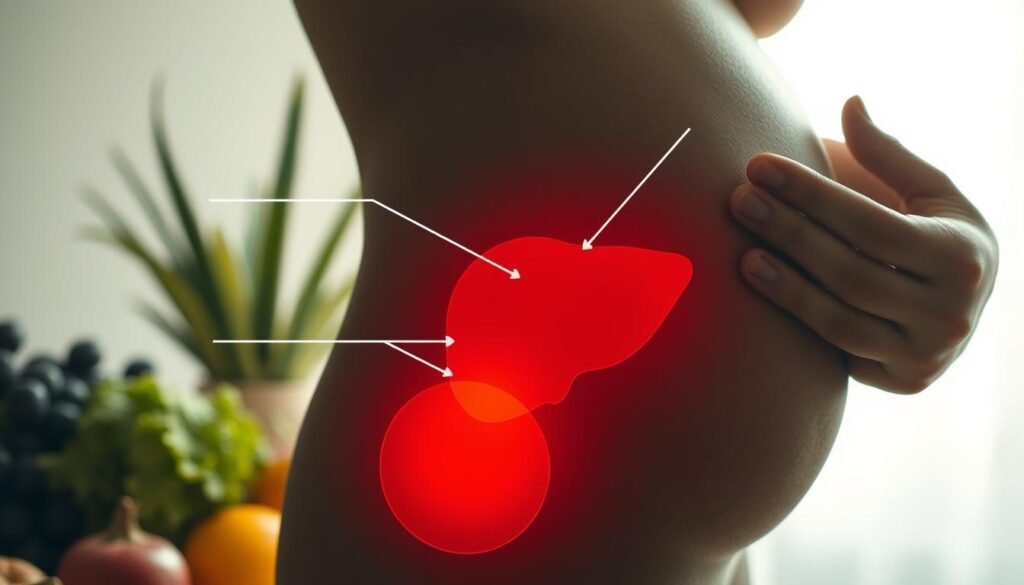Did you know up to 32% of people worldwide have nonalcoholic fatty liver disease (NAFLD)? This fact highlights the importance of liver health. If not addressed, fatty liver disease can lead to serious health issues. By focusing on liver health, people can greatly reduce their risk of this disease.
Readers will find tips here to keep their liver healthy every day. We’ll show how simple lifestyle choices can lead to a healthier future. These steps can improve liver function and encourage overall wellbeing. For more tips, including eating habits like the Mediterranean diet, visit this NAFLD resource.
Key Takeaways
- Fatty liver disease affects a significant portion of the global population, highlighting an urgent need for awareness.
- Healthy lifestyle changes can effectively prevent fatty liver disease and improve overall liver health.
- Incorporating a balanced diet and regular exercise is essential in managing liver health.
- Understanding the risk factors associated with fatty liver can guide individuals in making informed choices.
- Regular check-ups and monitoring are crucial in catching early signs of liver-related issues.
Understanding Fatty Liver Disease
Fatty liver disease happens when too much fat accumulates in the liver. This can lead to health problems. There are two main types: those linked to drinking too much alcohol and others not linked to alcohol (non-alcoholic fatty liver disease or NAFLD). Knowing about these helps us understand the risk factors and causes of fatty liver disease.
Types of Fatty Liver Disease
Alcoholic fatty liver disease is caused by drinking too much alcohol. This condition can lead to serious liver damage if it gets worse. On the other hand, NAFLD is more common and often linked to being overweight, having diabetes, or metabolic issues. It’s crucial to know the difference between these two because they need different ways to manage them.
Risk Factors and Causes
There are several risk factors for fatty liver disease, such as:
- Obesity
- Type 2 diabetes
- High cholesterol or triglyceride levels
- Metabolic syndrome
- Sedentary lifestyle
The reasons behind fatty liver disease vary. For NAFLD, it mainly comes down to problems with insulin and metabolism. Bad eating habits and not moving enough can make it worse. Getting to know these factors helps in preventing the disease. For more info, check out Mayoclinic’s guide.
| Type of Fatty Liver Disease | Primary Cause | Common Risk Factors |
|---|---|---|
| Alcoholic Fatty Liver Disease | Excessive alcohol intake | Heavy drinking, malnutrition |
| Non-Alcoholic Fatty Liver Disease (NAFLD) | Metabolic dysfunction | Obesity, diabetes, high cholesterol |
Preventing Fatty Liver Disease
Understanding how to prevent fatty liver disease is critical for good health. Taking steps early on not only cuts the risk of this condition but also boosts wellbeing. These strategies bring long-term health rewards.
Importance of Prevention
Preventing fatty liver disease is key to managing health over time. Embracing healthy habits and knowing the risks can help avoid liver issues. It’s also important to get regular health checks. This way, any issues can be found early, and steps can be taken to keep the liver healthy.
Early Detection and Monitoring
Spotting fatty liver early is crucial for stopping it in its tracks. With liver tests and scans, doctors can keep an eye on liver health. These checks spot problems early on. Staying on top of liver health helps people make smart choices and, when necessary, get the right medical advice to keep their liver in top shape.
Healthy Liver Habits
To keep your liver healthy, you need to live in a certain way. Having good habits helps reduce the chance of getting fatty liver disease. It makes you healthier overall. Doing things like working out often and staying away from bad stuff are key.
Regular Physical Activity
Working out regularly is crucial for your liver’s health. It keeps the liver working right. Exercising helps control your weight, which prevents fatty liver disease.
Activities like fast walking, swimming, and biking make your metabolism better. They also help your body handle fats well. Try to get 150 minutes of exercise like this every week to see benefits.
- Boosts metabolism
- Supports weight management
- Improves blood flow
- Reduces stress
Avoiding Harmful Substances
It’s vital to stay away from things that can hurt your liver. Drinking too much alcohol is very harmful and can cause inflammation and damage. Also, being around toxins in some foods, cleaners, and industrial products is bad for the liver. People should learn about what’s safe and cut down on bad stuff.
“Your liver is resilient, but it deserves care. Consider your long-term health in every choice you make.”
| Healthy Habits | Benefits |
|---|---|
| Regular Exercise | Enhances metabolism, supports weight, reduces fatty buildup |
| Avoid Alcohol | Prevents liver inflammation and damage |
| Limit Toxins | Reduces stress on liver function |
Liver-Friendly Diet
Eating right plays a huge role in keeping your liver healthy. Moving to a diet good for the liver is key. It means eating whole foods that help your liver work its best. By choosing foods that are rich in nutrients and avoiding the bad stuff, you help your liver.
Incorporating Whole Foods
Whole foods are full of the nutrients your body needs. Adding a mix of fresh fruits, vegetables, grains, and beans gives your body the right support. Here are some top picks:
- Leafy greens like spinach and kale
- Cruciferous vegetables such as broccoli and Brussels sprouts
- Whole grains including quinoa and brown rice
- Fruits like berries and apples
These choices help clean out your liver and boost your health.
Reducing Sugar and Processed Foods
Cutting back on sugar and processed foods is crucial. Too much sugar can cause fat to build up in your liver. This can lead to health problems. Try to stay away from:
- Soft drinks and sugary beverages
- Processed snacks and fast food
- Sweets and desserts high in refined sugars
Eating whole foods keeps your liver safe from disease and keeps your energy levels balanced.
Hydration and Liver Function
Being well-hydrated is key for a healthy liver. Drinking enough water helps your liver get rid of toxins. Make sure to drink water, herbal teas, and natural juices without extra sugar. You should drink:
- At least eight glasses of water daily
- Herbal teas like dandelion or milk thistle
- Fresh fruit juices without added sugars
Lifestyle Changes for Liver Health
Making changes in your lifestyle can greatly boost your well-being, especially liver health. Managing stress and getting enough sleep are key. Stress can hurt your liver and cause health issues like fatty liver disease. Ways to ease stress are important for keeping your liver healthy.
Managing Stress Levels
Keeping stress under control is critical for your liver’s health. Practices like meditation, yoga, and deep-breathing can help lower stress. They bring your mind to a calm state. Regular exercise also helps reduce stress and keeps your body healthy, which is good for your liver.
- Meditation: Dedicate at least 10 minutes per day to mindfulness.
- Yoga: Participate in sessions that focus on gentle movements and breathing.
- Physical Activity: Aim for at least 150 minutes of moderate exercise weekly.
Adequate Sleep for Liver Recovery
Good sleep is crucial for your body’s recovery, including the liver’s. The liver cleanses itself while you sleep. Better sleep hygiene can enhance sleep quality and liver health. To sleep better, stick to a regular sleep schedule and make your sleeping area comfortable.
- Consistent Sleep Schedule: Go to bed and wake up at the same time daily.
- Comfortable Sleep Environment: Keep the bedroom dark, cool, and quiet.
- Limit Screen Time: Reduce exposure to screens at least an hour before bedtime.
Non-Alcoholic Fatty Liver Prevention
Non-alcoholic fatty liver disease (NAFLD) is becoming more common. It’s important to know about this condition. Understanding how to prevent NAFLD means you can keep your liver healthy.
Understanding Non-Alcoholic Fatty Liver Disease
NAFLD means there’s too much fat in the liver of people who drink little or no alcohol. Two main reasons for this are bad eating habits and not moving enough. To avoid the disease, eat healthy and exercise.
Eating foods that are good for you and staying active lowers your risk. This keeps your liver healthy for a long time.
Navigating Alcohol Consumption
Drinking alcohol affects your liver. Even a little alcohol might be okay if your liver is healthy. But drinking too much can hurt your liver and increase NAFLD risk.
It’s important to know how much alcohol is safe. This helps keep your liver working well.
| Alcohol Type | Safe Intake (per day) | Potential Impacts on Liver Health |
|---|---|---|
| Beer | Up to 12 oz | High sugar content can lead to fat accumulation |
| Wine | Up to 5 oz | Polyphenols may provide some benefits in moderation |
| Spirits | Up to 1.5 oz | Higher risk for liver stress with excessive consumption |
Follow these alcohol guidelines to protect your liver. Making smart choices helps you develop habits that support your health.

Natural Remedies for Fatty Liver
People are looking for natural ways to keep their liver healthy. Herbs and supplements are key in this process. They provide nutrients that help the liver heal and work better. For many years, traditional methods have also helped keep livers functioning well.
Herbs and Supplements
Many herbs are valued for how they help the liver. Notable examples include:
- Milk Thistle: Its main part, silibinin, might guard liver cells.
- Dandelion Root: It’s used to boost liver detox and digestion.
- Turmeric: Its curcumin fights inflammation, aiding liver health.
Adding these to your daily life can make your liver work better and improve your health.
Traditional Practices Supporting Liver Wellness
Many cultures have long used traditional ways to improve liver health. These include special diets and foods that help the liver by natural means. Successful strategies involve:
- Detoxification Rituals: Diets and herbal teas that clean the liver of toxins.
- Fermented Foods: Adding things like kimchi and sauerkraut boosts gut and liver health.
- Mindful Eating: Eating unprocessed foods helps the liver work as it should.
Learning and using these old health practices can make you healthier. It also connects you more with your body’s own ways.
Identifying Symptoms of Fatty Liver
Knowing the symptoms of fatty liver is key to catching it early. People should listen to their bodies and spot anything unusual. Fatty liver symptoms can show up differently, so it’s important to watch for any small changes.
Recognizing Early Warning Signs
Some common signs of fatty liver include:
- Fatigue – Feeling tired all the time, even after resting.
- Weight loss – Losing weight without trying, along with other symptoms.
- Abdominal discomfort – Pain or discomfort in the top right part of your belly.
- Nausea – Feeling sick and like you might throw up.
Spotting these signs early can lead to quicker help from a doctor. Knowing about them lets people take control of their health and adjust their lifestyle.

| Symptom | Description |
|---|---|
| Fatigue | Constant tiredness that messes with everyday life. |
| Weight Loss | Losing weight quickly without knowing why. |
| Abdominal Discomfort | Ache or discomfort in the upper right stomach area. |
| Nausea | Feeling queasy, often with a need to vomit. |
Regular Health Check-Ups
Regular health check-ups are key for staying healthy, especially for the liver. If you’re at risk for fatty liver disease, regular blood checks are crucial. These checks help catch problems early and start prevention early.
What Tests to Consider
At your check-ups, you can get tests that tell you a lot about your liver’s health. Important tests include:
- Liver function tests – Measure enzymes, proteins, and substances produced by the liver.
- Ultrasound imaging – Non-invasive imaging technique to visualize the liver structure.
- Blood tests for liver enzymes – Assess enzyme levels to identify liver stress or damage.
Importance of Regular Blood Work
By doing regular blood work, doctors can keep an eye on your liver’s health. They can spot problems early with routine blood tests. This is especially true for people at high risk, as early detection is vital. Early action can reduce the impact of diseases like nonalcoholic fatty liver disease.
| Test Type | Purpose | Frequency |
|---|---|---|
| Liver Function Tests | Assess overall liver function | Annually or as recommended |
| Ultrasound Imaging | Visualize liver and identify abnormalities | Every 1-2 years for at-risk individuals |
| Blood Tests for Enzymes | Check for liver enzyme levels | Every 6-12 months depending on risk factors |
Practical Tips for Everyday Living
Adding good habits to your daily routine can greatly improve your liver health. These tips include good meal planning and creating a healthy environment. Following these steps is key to taking care of your liver.
Meal Planning for Liver Health
Planning your meals right is essential for liver health. Focus on fresh, whole foods and cut back on processed foods. This helps your liver work better.
Here’s how you can make your meals liver-friendly:
- Choose lean proteins such as chicken, fish, and legumes to provide essential amino acids.
- Incorporate plenty of fruits and vegetables rich in antioxidants, like berries, spinach, and kale.
- Limit added sugars and refine grains; opt for whole grains instead.
- Pay attention to portion sizes to prevent overeating, which can burden the liver.
- Experiment with meal prep techniques, such as batch cooking and freezing portions for convenience.
Creating a Supportive Environment
A liver-friendly lifestyle isn’t just about food. It’s also about making your living space healthy. This means clear spaces that support good habits and fewer toxins.
- Maintain clean air by minimizing toxins from household cleaning products and adopting natural alternatives.
- Stay hydrated with fresh water, promoting optimal liver function by drinking throughout the day.
- Create designated spaces for meal preparation, ensuring easy access to healthy ingredients.
- Encourage family participation in cooking and meal planning, strengthening collective healthy eating practices.

Using these tips, you can make choices that are good for your liver. Small changes in your daily life can bring big benefits to your health. It’s all about taking care of your liver every day.
Conclusion
Preventing fatty liver disease is key to keeping a healthy liver for a long time. This article has shown how important a balanced lifestyle is. By doing regular exercise, eating well, and avoiding bad substances, people can protect their liver.
Getting regular check-ups helps spot any problems early. This means any issues can be dealt with quickly. Eating right and joining support groups can help you take care of your whole health, not just your liver. This not only helps your liver but also boosts your overall health.
To prevent liver disease, it’s important to follow the advice given here. By doing this, you can improve your liver’s health and look forward to a healthier future. For more information on stopping fatty liver disease, you can read this detailed article. It offers more tips and support for keeping your liver in good shape.